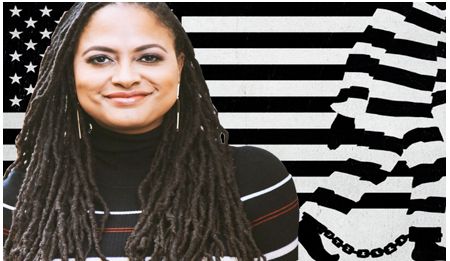CommentsJIM CROW IS ALIVE AND WELL-The film “13th” derives its title from the one exception to the 13th Amendment that abolished slavery in 1865: "except as a punishment for crime." As this documentary points out, this exception has allowed the profit-driven institution of slavery to continue unabated over the last 150 years in one form or another. Only the name has changed.
The coherence with which Compton's own documentary filmmaker Ava Du Vernay insightfully lays out various historical incarnations of this “slavery exception" that occurs within what we now call the “prison industrial complex” left me with an unanticipated takeaway: If the mostly minority contributors to the making of this exceptional film are representative of the awesome human ability and insight it took to make it, just how much more unrealized human potential might be languishing in our prisons?
What is still being lost within in our for-profit incarceration system -- where 97% of those behind bars never even had a trial because they were too poor or intimidated by the probability of a mandatory 30-year sentence if they went to court and lost?
Our excessive minimum sentencing laws, pushed by the American Legislative Exchange Council (ALEC), offer the mostly minority poor, who are caught up in a rigged criminal justice system, a Hobson's choice of copping a plea to a crime they didn't commit or facing a trial with a potential mandatory minimum 30-year sentence. Under these circumstances, it is understandable that they choose to play it safe and wind up in prison where, once in, many never fully emerge. This is because they are either hit with imaginary infractions that extend their sentences or end up unemployable (if they finally get out of prison) due to their criminal records.
As Du Vernay points out in “13th,” the one thing that never changes, no matter what incarnation the theft of Black labor takes, is that the greatest impediment to ending racism in America has always been the reality that somebody -- not the worker -- is always making obscene amounts of money in the belief that Black Lives (Don’t) Matter.
So you might ask, "Why don't I mention the white folks in prison?" The answer is simple. In a prison industrial complex that has gone from a population of 357,292 behind bars in 1970 to 2,306,200 in 2014 we find that Blacks make up 40.2% of the prison population. Put another way, 1 in 17 whites will spend some time in prison during that person’s lifetime. The figure for Black males is I in 3.
There is one area Du Vernay and her filmmaking colleagues could have explored in greater depth: she mentions in passing that the purposefully degraded, still segregated public education system plays a role in filling our prisons today. This happens when students are pushed through school without being trained or socialized in a manner that could make them productive members of society instead of being swept up in the prison industrial complex.
Put another way, I don't think the inner city communities like Chicago or other large minority filled urban areas in this country would experience the current levels of violence, murder and incarceration if we did not have purposefully failed and segregated public school systems. These schools seem content to measure success not by the achievements of their students, but by the profits their vendors can make, a process that continues to hold the leadership of these public school systems captive.
(Leonard Isenberg is a Los Angeles observer and a contributor to CityWatch. He was a second generation teacher at LAUSD and blogs at perdaily.com. Leonard can be reached at Lenny@perdaily.com) Edited for CityWatch by Linda Abrams.
Explore
Our mission is to promote and facilitate civic engagement and neighborhood empowerment, and to hold area government and its politicians accountable.

 CityWatch Los Angeles
Politics. Perspective. Participation.
CityWatch Los Angeles
Politics. Perspective. Participation.
05
Wed, Mar















